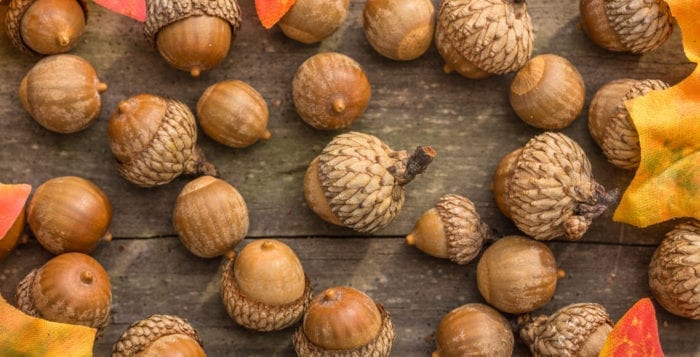By Ellen Barcel
“The sky is falling! The sky is falling!” Chicken Little shouted. Well, this year, the sky isn’t exactly falling, but leaves sure are and so are lots and lots of acorns. Why? Well, a bit of plant biology first and then some theories.
Over the many millions of years that plants have existed on Earth, they have evolved to survive in their unique environments. Long Island formed after the last glacier, around 10,000 years ago. Plants that evolved to survive well in acidic soil, like oak trees and pines, established themselves here — Long Island has very acidic soil. Since Long Island has occasional droughts, plants that do well in droughts also do well here.
This past year Long Island has gone through drought conditions. Seven of the past nine months (January through September) the rainfall has been below average. August, for example, received just over two inches while the average is slightly over four. June was also particularly bad with just over one inch of rain while the average is nearly four. So, the ability to withstand occasional drought conditions is very useful for plants that establish themselves on Long Island. And, yes, oak trees have a taproot that goes way down into the soil, where there is more likely to be water.
So, oak trees have two ways of growing well on Long Island: their ability to do well in acidic soil and their taproots. This year, it seems that the local oak trees have produced lots of those acorns, that is, the seeds for future generations of trees were abundant, very abundant. This abundance is referred to as masting or mast years.
Said a gardening friend of mine from Farmingville, “You can’t walk out of the house without slipping and sliding … I almost broke my neck … The deck is covered. All night you hear them falling … the gutters are full of them … when you drive down the driveway you crush them.”
So, the question is, why the abundance of acorns some years and not others? There must be some sort of survival mechanism in producing lots of acorns, but why some years and not others? There are many theories.
1. One is that an extensive crop of acorns predicts a harsh winter. This theory assumes that oak trees have some way of predicting the future. My feeling is that when a big acorn crop and a harsh winter coincide it’s more likely a coincidence than oak trees’ ability to predict the future.
2. A theory I read about many years ago is that an extensive acorn crop is a way that oak trees have of dealing with harsh conditions. By putting all their energy in a nasty year into producing acorns, they’re guaranteeing the survival of the species. This is more likely. We did have drought conditions this past year, but remember that oak trees, with their taproots, do well in drought conditions.
3. The most likely explanation, however, is that we had mild, favorable conditions in spring for the production of oak flowers and therefore acorns. As a result we have been inundated with a large crop, a crop that has been falling and falling all over the place. Of course, there may be other factors involved. Oak trees have both male and female flowers on the same tree. Suppose there is a late frost in the previous spring, damaging the flowers that will become future acorns. Or suppose it’s been a particularly windy spring, again damaging the flowers, or excessive rain-storms. White oak trees take one year to produce acorns, while red oak (which includes pin oaks) take two. So, if the trees that are masting are red oak, we need to go back two springs to examine the weather at that time, not just this past spring. Confusing, isn’t it?
Whatever your theory, the abundance of acorns sort of guarantees fat squirrels, deer, raccoons, possums, rabbits, chipmunks and even blue jays and wild turkeys this winter, even if it is a harsh one. In the meantime, get out your broom and at least clean the acorns from your walkways so you don’t slip.
Ellen Barcel is a freelance writer and master gardener. To reach Cornell Cooperative Extension and its Master Gardener program, call 631-727-7850.





